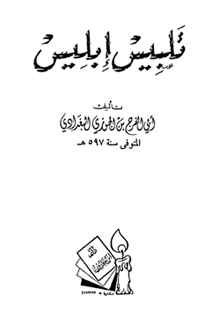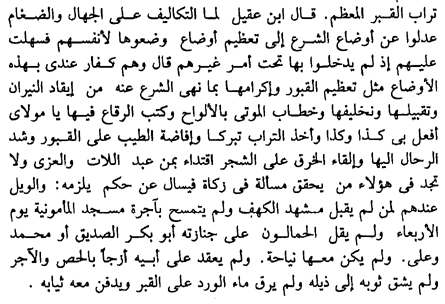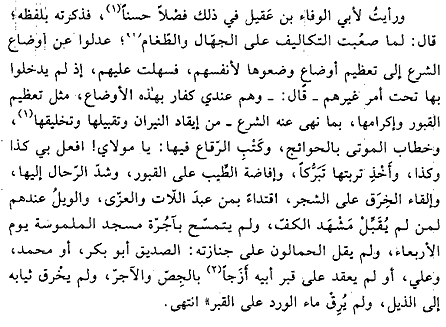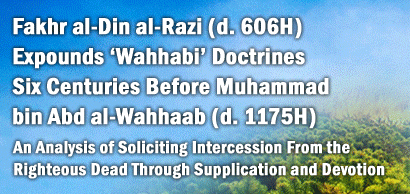 |
You are here:
Home  General
General
Ibn Aqeel Al-Hanbali (d. 513H) and Ibn Al-Jawzee Al-Hanbali (d. 597H) and Ibn Al-Qayyim (d. 751H) on Invoking the Dead for Needs and Assistance
Posted by Abu.Iyaad, Editor in General
|
 |

 Abū al-Wafā Ibn ʿAqīl (d. 513H) was a Hanbali scholar who became affected by the Muʿtazilah, and had Muʿtazilī teachers. Towards the end of his life he repented from that and aided and supported the way of the people of ḥadīth. He was one of numerous Ḥanbalis affected by ʿilm al-kalām through the Ashʿarites in the fifth century hijrah, others being al-Qādī Abu Yaʿlā (d. 453H), and Abū al-Ḥasan Ibn al-Zāghūnī (d. 527H) by way of example. Abū al-Faraaj Ibn al-Jawzī (d. 597H), another Hanbalī scholar was confused in the matter of the divine attributes and held contradictory positions, being from a line of Hanbalīs who fell prey to something of the deviation and kalām of the Muʿtazilah and Kullābiyyah in taʿṭīl and errors in the affirmation of the divine attributes. He was affected by those whom he blindly followed, chief amongst them Abū al-Wafā' Ibn ʿAqīl, who was his 'Shaykh' (in the sense of strong influence, not his direct Shaykh). Alongside this, he was very severe against the Ashʿarites and detested them, as is clear from some of his works. Despite these errors, these Hanbali scholars recognized what the commom people had fallen into of flocking to the graves and soliciting aid and assistance from them through invocation and seeking blessings from their graves. This was also pointed out by Fakhr al-Din al-Razi who was contemporary to Ibn al-Jawzee (see this article). Abū al-Wafā Ibn ʿAqīl (d. 513H) was a Hanbali scholar who became affected by the Muʿtazilah, and had Muʿtazilī teachers. Towards the end of his life he repented from that and aided and supported the way of the people of ḥadīth. He was one of numerous Ḥanbalis affected by ʿilm al-kalām through the Ashʿarites in the fifth century hijrah, others being al-Qādī Abu Yaʿlā (d. 453H), and Abū al-Ḥasan Ibn al-Zāghūnī (d. 527H) by way of example. Abū al-Faraaj Ibn al-Jawzī (d. 597H), another Hanbalī scholar was confused in the matter of the divine attributes and held contradictory positions, being from a line of Hanbalīs who fell prey to something of the deviation and kalām of the Muʿtazilah and Kullābiyyah in taʿṭīl and errors in the affirmation of the divine attributes. He was affected by those whom he blindly followed, chief amongst them Abū al-Wafā' Ibn ʿAqīl, who was his 'Shaykh' (in the sense of strong influence, not his direct Shaykh). Alongside this, he was very severe against the Ashʿarites and detested them, as is clear from some of his works. Despite these errors, these Hanbali scholars recognized what the commom people had fallen into of flocking to the graves and soliciting aid and assistance from them through invocation and seeking blessings from their graves. This was also pointed out by Fakhr al-Din al-Razi who was contemporary to Ibn al-Jawzee (see this article).
In this article we want to document a statement cited by both Ibn al-Jawzee and Ibn al-Qayyim from Ibn Aqeel on what became common in their time with respect to veneration of the graves and worship of the righteous dead. At the very end of Talbees Iblees of Ibn al-Jawzee, he writes (Dar Ibn Khaldun, p. 398), [whilst noting there are some typographical errors in the arabic print]:
 Ibn Aqeel said: When the religious duties became burdensome upon the ignorant and common riff-raff, they turned away from the symbols (of worship) of the Shariah (and took to) veneration of other symbols (of religious practice) they had devised for themselves. Thus, (the affair) became easy for them as they were no longer under the authority of others. He (Ibn Aqeel) said: And they are disbelievers in my view on account of these symbols (of practice), such as veneration of the graves, honouring them with that which is prohibited in the Shariah, such as lighting fire (besides them), kissing them, placing perfume on them (takhleeq, from khaluq, a form of perfume), and verbally addressing the dead with needs [alwaah means hawaa'ij], and placing written requests on them, "O master, do such and such for me," and taking the soil to attain blessing, following (in all of that) the one who worshipped al-Laat and al-Uzzaa. You will not find amongst them one who verifies a matter pertaining to zakaah, asking about its ruling so that he can abide by it.... Ibn Aqeel said: When the religious duties became burdensome upon the ignorant and common riff-raff, they turned away from the symbols (of worship) of the Shariah (and took to) veneration of other symbols (of religious practice) they had devised for themselves. Thus, (the affair) became easy for them as they were no longer under the authority of others. He (Ibn Aqeel) said: And they are disbelievers in my view on account of these symbols (of practice), such as veneration of the graves, honouring them with that which is prohibited in the Shariah, such as lighting fire (besides them), kissing them, placing perfume on them (takhleeq, from khaluq, a form of perfume), and verbally addressing the dead with needs [alwaah means hawaa'ij], and placing written requests on them, "O master, do such and such for me," and taking the soil to attain blessing, following (in all of that) the one who worshipped al-Laat and al-Uzzaa. You will not find amongst them one who verifies a matter pertaining to zakaah, asking about its ruling so that he can abide by it....
This statement is also cited by Ibn al-Qayyim in his book (إغاثة اللهفان من مصائد الشيطان) (Dar Ibn al-Jawzee, 2/264):
 And I saw that Ibn Aqeel had a good section regarding that, so I mentioned it with his very words, he said: When the religious duties became burdensome upon the ignorant and common riff-raff, they turned away from the symbols (of worship) of the Shariah (and took to) veneration of other symbols (of religious practice) they had devised for themselves. Thus, (the affair) became easy for them as they were longer under the authority of others. He (Ibn Aqeel) said: And they are disbelievers in my view on account of these symbols (of practice), such as veneration of the graves, honouring them with that which is prohibited in the Shariah, such as lighting fire (besides them), kissing them, sitting behind them, and verbally addressing the dead with (their) needs [hawaa'ij], and placing written requests on them, "O master, do such and such for me," and taking the soil to attain blessing, and placing perfume on the graves, and setting out specifically to travel to them, and placing pieces of cloth on trees, following (in all of that) the one who worshipped al-Laat and al-Uzzaa... And I saw that Ibn Aqeel had a good section regarding that, so I mentioned it with his very words, he said: When the religious duties became burdensome upon the ignorant and common riff-raff, they turned away from the symbols (of worship) of the Shariah (and took to) veneration of other symbols (of religious practice) they had devised for themselves. Thus, (the affair) became easy for them as they were longer under the authority of others. He (Ibn Aqeel) said: And they are disbelievers in my view on account of these symbols (of practice), such as veneration of the graves, honouring them with that which is prohibited in the Shariah, such as lighting fire (besides them), kissing them, sitting behind them, and verbally addressing the dead with (their) needs [hawaa'ij], and placing written requests on them, "O master, do such and such for me," and taking the soil to attain blessing, and placing perfume on the graves, and setting out specifically to travel to them, and placing pieces of cloth on trees, following (in all of that) the one who worshipped al-Laat and al-Uzzaa...
Notes
Ibn Aqeel has pointed out what he observed in the fifth and sixth century hijrah of the people invoking and addressing the righteous dead to assist them in their needs and a variety of other practices which comprise veneration of the graves. This veneration was aimed not at worshipping the actual grave or any other symbol which were really only focal points, but for the person in the grave, hoping by this veneration, that they will win favour of that dead person, who will then intercede for them or fulfil their needs. This reasoning is explained by Fakhr al-Din al-Razi (read about it here) who explains that no nation in history ever believed in Rububiyyah for anything besides Allaah with the exception of the dualists, and when these people worship the idols and other symbols, they are not actually worshipping these entities, as no sane person believes that they have control or power, but that they intend veneration of those they are supposed to represent or for whom they are a focal point. Also worthy of pointing out is that the Scholars have clarified that not every one of these actions mentioned by Ibn Aqeel constitutes Shirk in and of itself, since some of them require some detail, such as placing perfumes on the graves, and kissing them and so on. But as for invoking them for needs and assistance (mentioned specifically by Ibn Aqeel), there is not doubt this is a nullifier of Islaam on its own, and this is why he said, "They are disbelievers in my view..."
Aside from the above observations, everything we said in the article from al-Hajjaawiyy (d. 968H) - (see here) - on the issue of seeking intermediaries with Allaah in light of Hanbali Fiqh is applicable here too, so we can reproduce those notes and points here as well:
The first: Refutation of the claim that Shaykh Muhammad bin Abd al-Wahhaab brought a new doctrine never known before. Rather, this is what the Prophet's and Messengers came with, the call to singling out Allaah in worship and the shunning of worship besides them. When Shirk started become widespread in the Ummah and people flocked to the graves the Scholars made not of that and spoke about it, and from them, Ibn Aqil, Ibn al-Jawzee, Fakhr al-Din al-Razi (see here), Ibn Taymiyyah, and others.
The second: This is a matter of ijmaa' (consensus) in the madhhab as corroborated by the most learned of the Hanbalite jurists of the time who were alive a century before Shaykh Muhammad bin Abd al-Wahhaab was even born, and who themselves were preceded in this takfir of the one who took others for worship besides Allaah by the likes of Ibn Aqeel (d. 513H) and Ibn al-Jawzee (d. 597H) by another three centuries.
The third: Spuriousness of the claim that Shaykh Muhammad bin Abd al-Wahhaab exited from the domain of the four madhhabs, this is plain falsehood and academic fraud.
The fourth: Exposition and unveiling of the new fake "Hanbalis", who are Ash'ari-Sufi-Mufawwidhah in reality, but who are trying to push their doctrines by wearing the cloak of Hanbali fiqh. They are actually hypocrites (in action), and the mere fact that they vilify Shaykh Muhammad bin Abd al-Wahhab and claim adherence to the Hanbali fiqh at the same time exposes them as liars and deceivers from the very outset. Claiming attachment to the Hanbali madhhab and then vilifying Shaykh Ibn Abd al-Wahhaab for declaring as Shirk the setting up of intermediaries with Allaah, calling upon them, and directing worship to them (a matter of ijmaa' in the madhhab) are two diametrically opposed affairs. It is a contradiction to claim association with the Hanbali fiqh and find fault with Shaykh Muhammad bin Abd al-Wahhaab's call to the Tawhid of the Messengers.
Link to this article: Show:
HTML Link •
Full Link •
Short Link
Share or Bookmark this page: You will need to have an account with the selected service in order to post links or bookmark this page.







|
|
|
Add a Comment
You must be registered and logged in to comment.
|
 |




|
 |
 General
General



 Abū al-Wafā Ibn ʿAqīl (d. 513H) was a Hanbali scholar who became affected by the Muʿtazilah, and had Muʿtazilī teachers. Towards the end of his life he repented from that and aided and supported the way of the people of ḥadīth. He was one of numerous Ḥanbalis affected by ʿilm al-kalām through the Ashʿarites in the fifth century hijrah, others being al-Qādī Abu Yaʿlā (d. 453H), and Abū al-Ḥasan Ibn al-Zāghūnī (d. 527H) by way of example. Abū al-Faraaj Ibn al-Jawzī (d. 597H), another Hanbalī scholar was confused in the matter of the divine attributes and held contradictory positions, being from a line of Hanbalīs who fell prey to something of the deviation and kalām of the Muʿtazilah and Kullābiyyah in taʿṭīl and errors in the affirmation of the divine attributes. He was affected by those whom he blindly followed, chief amongst them Abū al-Wafā' Ibn ʿAqīl, who was his 'Shaykh' (in the sense of strong influence, not his direct Shaykh). Alongside this, he was very severe against the Ashʿarites and detested them, as is clear from some of his works. Despite these errors, these Hanbali scholars recognized what the commom people had fallen into of flocking to the graves and soliciting aid and assistance from them through invocation and seeking blessings from their graves. This was also pointed out by
Abū al-Wafā Ibn ʿAqīl (d. 513H) was a Hanbali scholar who became affected by the Muʿtazilah, and had Muʿtazilī teachers. Towards the end of his life he repented from that and aided and supported the way of the people of ḥadīth. He was one of numerous Ḥanbalis affected by ʿilm al-kalām through the Ashʿarites in the fifth century hijrah, others being al-Qādī Abu Yaʿlā (d. 453H), and Abū al-Ḥasan Ibn al-Zāghūnī (d. 527H) by way of example. Abū al-Faraaj Ibn al-Jawzī (d. 597H), another Hanbalī scholar was confused in the matter of the divine attributes and held contradictory positions, being from a line of Hanbalīs who fell prey to something of the deviation and kalām of the Muʿtazilah and Kullābiyyah in taʿṭīl and errors in the affirmation of the divine attributes. He was affected by those whom he blindly followed, chief amongst them Abū al-Wafā' Ibn ʿAqīl, who was his 'Shaykh' (in the sense of strong influence, not his direct Shaykh). Alongside this, he was very severe against the Ashʿarites and detested them, as is clear from some of his works. Despite these errors, these Hanbali scholars recognized what the commom people had fallen into of flocking to the graves and soliciting aid and assistance from them through invocation and seeking blessings from their graves. This was also pointed out by  Ibn Aqeel said: When the religious duties became burdensome upon the ignorant and common riff-raff, they turned away from the symbols (of worship) of the
Ibn Aqeel said: When the religious duties became burdensome upon the ignorant and common riff-raff, they turned away from the symbols (of worship) of the  And I saw that Ibn Aqeel had a good section regarding that, so I mentioned it with his very words, he said: When the religious duties became burdensome upon the ignorant and common riff-raff, they turned away from the symbols (of worship) of the
And I saw that Ibn Aqeel had a good section regarding that, so I mentioned it with his very words, he said: When the religious duties became burdensome upon the ignorant and common riff-raff, they turned away from the symbols (of worship) of the 








